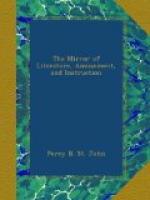When shooting on Lord Sligo’s mountains, near the Killeries, I heard many particulars of the eagle’s habit and history from a grey-haired peasant who had passed a long life in these wilds. The scarcity of hares, which here were once abundant, he attributed to the rapacity of those birds; and he affirmed, that when in pursuit of these animals, the eagle evinced a degree of intelligence that appeared extraordinary. They coursed the hares, he said, with great judgment and certain success; one bird was the active follower, while the other remained in reserve, at the distance of forty or fifty yards. If the hare, by a sudden turn, freed himself from his most pressing enemy, the second bird instantly took up the chase, and thus prevented the victim from having a moment’s respite.
He had remarked the eagles also while they were engaged in fishing. They chose a small ford upon the rivulet which connects Glencullen with Glandullagh, and posted on either side waited patiently for the salmon to pass over. Their watch was never fruitless,—and many a salmon, in its transit from the sea to the lake, was transferred from his native element to the wild aerie in the Alpine cliff; that beetles over the romantic waters of Glencullen.
[The volumes are handsomely printed, and embellished with aqua-tint plates and clever vignettes: some of the latter, by Bagg, are spirited performances on wood.]
* * * * *
PETER THE GREAT.
[What a mine of adventure and incident is the life of this extraordinary man. A modern French writer enumerates 95 authors who have treated of his actions, and concludes the list with et cetera threefold. What a field for the editors of the compilation libraries—wherein they may store their little garners or volumes to advantage. Such has the editor of the Family Library done in the volume before us; although he has only consulted one-fourth of the above number of authorities for his memoir of the life of the Tzar. He prefaces with the modest observation that he has done little more than bring together and arrange the scattered fragments of Histories, Lives, Anecdotes, and Notices, in manuscript and in print, “of one of the most extraordinary characters that ever appeared on the great theatre of the world, in any age or country;—a Being full of contradictions, yet consistent in all that he did; a promoter of literature, arts, and sciences, yet without education himself; the civilizer of his people, ‘he gave a polish,’ says Voltaire, ’to his nation, and was Himself a savage; he taught his people the art of war, of which he was himself ignorant; from the first glance of a small cock-boat, at the distance of five hundred miles of the nearest sea, he became an expert ship-builder, created a powerful fleet, partly constructed with his own hands, made himself an active and expert sailor, a skilful pilot, a great captain: in short, he




